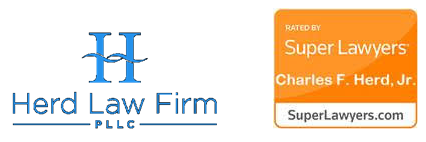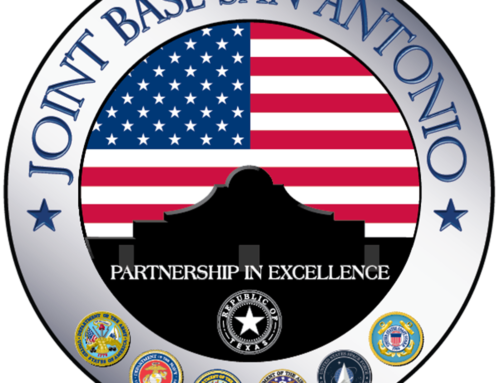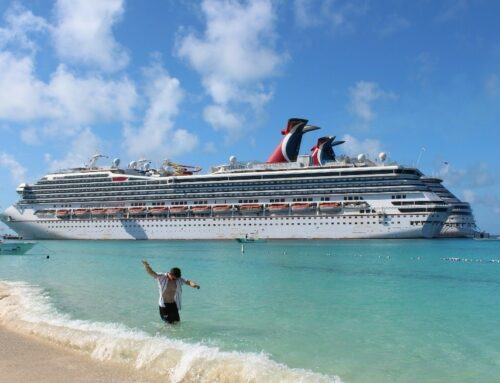It’s National Safe Boating Week!
Top Ways to Get Assistance on the Water While Boating
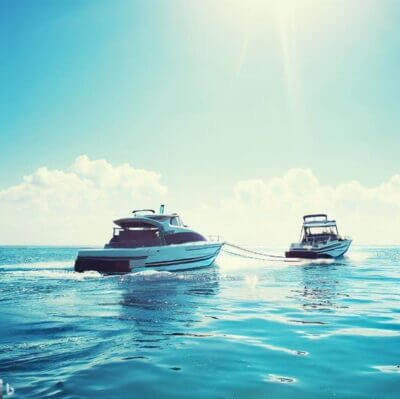 Boating is a fun and relaxing activity, but it also can pose some challenges and risks. Whether you run out of fuel, have a mechanical breakdown, get lost, or encounter bad weather, you may need some help on the water.
Boating is a fun and relaxing activity, but it also can pose some challenges and risks. Whether you run out of fuel, have a mechanical breakdown, get lost, or encounter bad weather, you may need some help on the water.
Fortunately, there are several ways to get assistance on the water while boating. Here are some of the top options you should know about:
Coast Guard and Other Vessel Assistance
One of the primary ways of getting assistance on the water while boating is to contact the U.S. Coast Guard, or another vessel. The Coast Guard is the federal agency responsible for maritime safety, security, and environmental protection. They can aid boaters in distress or in emergency situations.
Some of the situations where you may need Coast Guard assistance, or assistance from another vessel, are:
- You or someone on board is injured or ill and needs medical attention.
- Your boat is sinking, capsizing, or on fire and poses a threat to life or property.
- Your boat is aground or disabled in a hazardous area and cannot be moved by other means.
- You are lost or disoriented and need navigation guidance.
- You witness or encounter another vessel in distress or danger.
To contact the Coast Guard or hail other vessels for assistance, you can use one of the following methods:
- VHF Radio – A VHF (Very High Frequency) radio, which has a range of several miles, is the most reliable way to communicate with other boats and emergency responders on most waterways. New Digital Selective Calling (DSC) radios with a red distress button can even send an emergency call and other important information to authorities automatically when properly installed and registered. If in need of assistance, use VHF-FM channel 16 (156.8 MHz), which is the international hailing and distress frequency. This is the preferred and most reliable method, as it also allows other nearby boaters to hear your call and offer help if possible.
- Call the Coast Guard on their toll-free number 1-800-323-7233 (1-800-DAD-SAVE), which connects you to the nearest Coast Guard station or command center.
- Use an Emergency Position Indicating Radio Beacon (EPIRB), which is a device that transmits a distress signal with your location to satellites and rescue centers. It can be activated to send a distress signal in remote areas where cell phone coverage is not available.
- Use a Personal Locator Beacon (PLB), which is a smaller version of an EPIRB that you can wear on your person or attach to your life jacket. EPIRBs and PLBs can be rented from the BoatUS Foundation.
- A sound producing device, such as an installed horn, a handheld air horn, and even a whistle, can be used to signal for help. Five or more blasts from a horn or a whistle indicates danger, or a dangerous situation is unfolding. Sound-producing devices are required by law on most boats, and can be heard over a considerable distance.
- Visual Distress Signals (VDS) such as pyrotechnic flares and certain battery-operated SOS light beacons, can be used to signal for help when you are out on the water. Flares and Coast Guard-approved distress lights can be seen from several miles away, and are an effective way to signal for help when other methods of communication are not available.
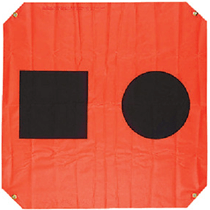 Distress Flag – A distress flag is an orange flag with a black square and a black circle. If you are in distress, you can hoist the flag to signal other boats that you need assistance. This is a good alternative for use on small, wet watercraft, like kayaks and personal watercraft, where traditional flares could get wet or storage aboard is a challenge.
Distress Flag – A distress flag is an orange flag with a black square and a black circle. If you are in distress, you can hoist the flag to signal other boats that you need assistance. This is a good alternative for use on small, wet watercraft, like kayaks and personal watercraft, where traditional flares could get wet or storage aboard is a challenge.
Boat Towing Services
One of the most common and convenient ways to get assistance on the water while boating is to use a boat towing service. These are professional companies that offer on-water assistance for boaters in need. They can tow your boat to a safe location, deliver fuel or parts, jump-start your battery, or provide other services. Some of the benefits of using a boat towing service are:
- You can call them anytime, day or night, 365 days a year.
- You can choose from different membership plans that suit your boating needs and budget.
- You can enjoy priority service and no out-of-pocket costs for covered services.
- You can access a network of local captains and boats that know the area and conditions.
- You can get discounts on boat insurance, marine products, and services.
Some of the most popular boat towing services in the US are BoatUS and Sea Tow. Both offer nationwide coverage and various membership options. You can compare their plans and benefits in the table below:
|
Service |
BoatUS |
Sea Tow |
|
Annual Membership Fee |
$85-$159 |
$119-$199 |
|
Towing Coverage |
Unlimited |
Unlimited |
|
Fuel Delivery |
Yes |
Yes |
|
Jump-Starts |
Yes |
Yes |
|
Soft Ungroundings |
Yes |
Yes |
|
Salvage and Wreck Removal |
Yes |
Yes |
|
Dock-to-Dock Towing |
Yes (for higher plans) |
No |
|
Trailer Assist |
Yes (for higher plans) |
No |
Boating Safety Grants/Education
A third way to get assistance on the water while boating is to take advantage of boating safety grants. These are funds that are awarded by the federal government or other organizations to support boating safety education and outreach programs. These programs aim to reduce boating accidents, injuries, and fatalities by providing boaters with information, training, equipment, and resources. Some of the benefits of participating in boating safety grants are:
- You can learn about boating laws, regulations, and best practices.
- You can improve your boating skills and confidence through courses, workshops, or online modules.
- You can obtain or renew your boating license or certificate if required by your state.
- You can access free or low-cost safety equipment such as life jackets, flares, fire extinguishers, etc.
- You can join a community of boaters who share your passion and interest.
Some of the most popular boating safety grants in the US are offered by the Coast Guard, the BoatUS Foundation, and the National Safe Boating Council. These all have different eligibility criteria, application processes, and deadlines. You can find more information about their programs and benefits on their websites.
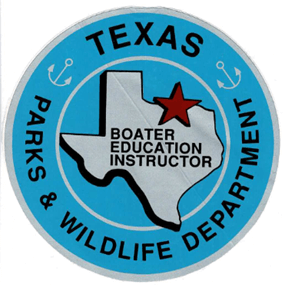 Boating is a great way to enjoy nature, relax, and have fun. However, it also comes with some challenges and risks that require preparation and awareness. If you ever need assistance on the water while boating, you have many good options to choose from. You can use a boat towing service for non-emergency assistance, or contact the Coast Guard for emergencies. Boating safety grants for education and equipment purposes are also a good resource. By knowing these options and how to use them, you can ensure a safe and enjoyable boating experience.
Boating is a great way to enjoy nature, relax, and have fun. However, it also comes with some challenges and risks that require preparation and awareness. If you ever need assistance on the water while boating, you have many good options to choose from. You can use a boat towing service for non-emergency assistance, or contact the Coast Guard for emergencies. Boating safety grants for education and equipment purposes are also a good resource. By knowing these options and how to use them, you can ensure a safe and enjoyable boating experience.
We at the Herd Law Firm are proud to fight for maritime workers and passengers in all types of personal injury claims, and never waver in our commitment to help these maritime workers and their families when they are injured.
Charles Herd is a Texas Department of Parks and Wildlife-certified Boater Safety Instructor as well!
5/22/2023
Sources:
- https://boatus.com/
- https://seatow.com/
- https://seatow.com/blog/unmatched-benefits-of-membership
- https://www.boatus.com/products-and-services/boat-towing
https://www.uscgboating.org/grants/state-grants-rbs-program.php

